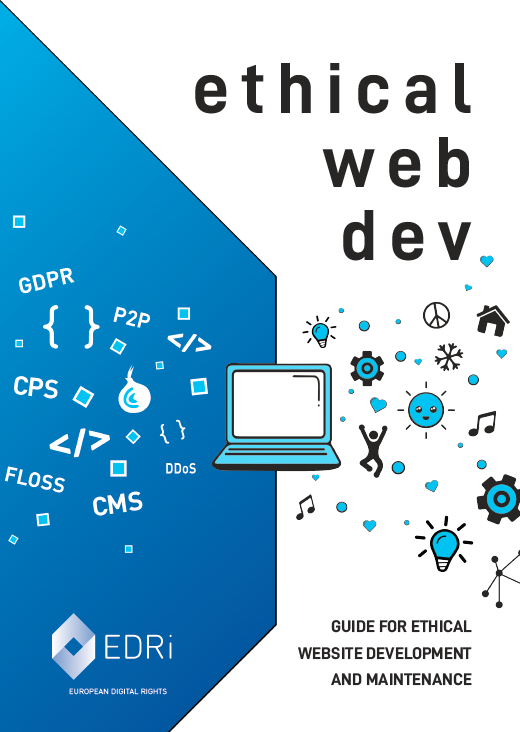Booklet: #EthicalWebDev – guide for ethical website development and maintenance
We’ve finally published our new guide for ethical website development and maintenance, Ethical Web Dev! Explore the guide here
We’ve finally published our new guide for ethical website development and maintenance, Ethical Web Dev! It’s aimed at web developers and maintainers who have a strong understanding of technical concepts, to assist them in bringing the web back to its roots – a decentralised tool that can enhance fundamental rights, democracy and freedom of expression.

The goal of the project, which started more than a year ago, was to provide guidance to developers on how to move away from third-party infected, data-leaking, unethical and unsafe practices. We hope this guide will be a beneficial tool for the field, and will help us walk the path towards the web we want.

Read in Turkish.
A website is almost like a living thing. Most of the time the basic site itself is not static and in addition to its own dynamic features, its environment is also subject to continuous change which in turn leads to even more changes. Visitors of a website can also be very diverse. The technologies they use and their expertise may vary widely. Many websites themselves also rely on a variety of external services and resources. These also continue to evolve.
As website developers have to cope at the same time with the increasing expectations of users and the limited resources most organisations devote to website development, there is a growing tendency to use more external services and resources. For example, it has become more and more common for web developers to take “free” resources, such as fonts and scripts and use them on the websites that they design. While these are “free” for the developer, they can have undesirable side effects for the users and the organisations that provide the website. For example some resources and services, particularly those provided by certain data hungry internet companies, can undermine user privacy. Others can have adverse affects on security. In both cases, the reputation of the website owner may suffer, or it may even face legal challenges. This warrants attention. However, there is a general lack of awareness of this problem, and these practices have already become quite pervasive. The purpose of this new guide is to clarify the problems and, where possible, identify some usable solutions.
The guide is a result of an extensive collective work, with inputs from experts of the EDRi network (Anders Jensen-Urstad, Walter van Holst, Maddalena Falzoni, Hanno “Rince” Wagner, Piksel), external contributions (Gordon Lennox, Achim Klabunde, Laura Kalbag, Aral Balkan), and the crucial help of Sid Rao, Public Interest Technologist and ex-Ford-Mozilla Fellow at EDRi. Special thanks to Joe McNamee who had the original idea for this booklet and steered the process to a successful conclusion, and Guillermo Peris for coordinating the project.
The guide is distributed under a Creative Commons 2.0 Licence (CC BY 2.0).
Ethical Web Dev – Guide for ethical website development and maintenance
https://edri.org/wp-content/uploads/2020/11/ethical_web_dev_web.pdf
Also available in Turkish.


